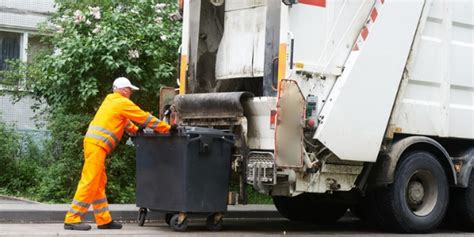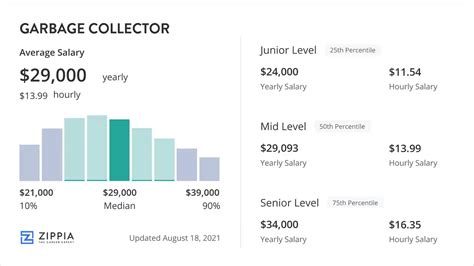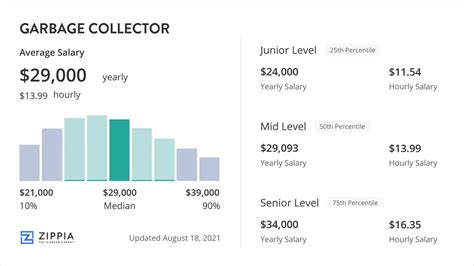Often overlooked, a career as a trash collector—or more formally, a Refuse and Recyclable Material Collector—is one of the most essential and stable jobs in our society. While it’s a physically demanding role, it offers surprising financial potential, with many professionals earning a salary that rivals many office-based jobs, often with excellent benefits and without the need for a college degree. In this guide, we'll break down a trash collector's salary, the factors that influence it, and the outlook for this vital profession.
What Does a Trash Collector Do?

A refuse and recyclable material collector is a frontline worker in public health and environmental management. Their primary role is to collect waste and recyclables from residential neighborhoods, commercial businesses, and industrial sites.
Key responsibilities include:
- Operating heavy-duty trucks equipped with lifting mechanisms.
- Driving designated routes, navigating dense urban streets and quiet suburban roads.
- Lifting and moving heavy bins and containers to be emptied into the truck.
- Sorting recyclable materials and handling waste according to safety and disposal regulations.
- Performing basic vehicle inspections and maintenance.
This job requires physical strength, a strong awareness of safety protocols, and, in many cases, the skill to operate complex and powerful machinery.
Average Trash Collector Salary

While public perception might suggest otherwise, compensation for refuse collectors is competitive. According to the most recent data from the U.S. Bureau of Labor Statistics (BLS), the median annual wage for refuse and recyclable material collectors was $49,580 in May 2023. This equates to a median hourly wage of $23.84.
The "median" represents the midpoint—half of all workers in the profession earned more than that amount, and half earned less. The salary range is quite broad, reflecting differences in experience, location, and employer.
- The lowest 10% of earners made less than $31,520.
- The top 10% of earners brought in more than $77,900.
Salary aggregator Salary.com reports a similar median salary of $50,551, with a typical range falling between $44,533 and $57,980 for an experienced collector in the United States. This data confirms that a career in waste collection can provide a solid, middle-class income.
Key Factors That Influence Salary

Averages provide a good starting point, but your actual earnings will depend on several key variables. Understanding these factors is crucial for maximizing your income potential in this field.
Level of Education
Unlike many professions, a four-year college degree is not a factor in a trash collector's salary. Most positions require a high school diploma or equivalent, and some employers do not have a formal education requirement at all.
The most significant educational credential in this field is a Commercial Driver's License (CDL). Drivers who operate the large, heavy collection trucks must possess a CDL, typically a Class B license. Obtaining a CDL requires specialized training and passing a rigorous test. As a result, collectors who are also certified drivers (often called "Driver/Operators") command significantly higher pay than those who only perform the loading duties.
Years of Experience
Experience is a major driver of salary growth. Entry-level collectors learn routes, safety procedures, and efficient work habits on the job.
- Entry-Level (0-2 years): New collectors can expect to start at the lower end of the pay scale, typically in the $35,000 to $42,000 range, as they gain experience.
- Mid-Career (3-9 years): With a few years of experience, a clean safety record, and route mastery, collectors can expect to earn closer to the national median of $49,580.
- Senior-Level (10+ years): Highly experienced collectors, especially those with a CDL and a record of reliability, can earn in the top quartiles, often exceeding $60,000 or even $70,000, particularly if they take on supervisory or training roles.
Geographic Location
Where you work is one of the single biggest factors determining your salary. Earnings vary dramatically based on the cost of living and regional demand. The BLS highlights the top-paying states for this profession:
1. Washington: Average annual salary of $71,270
2. California: Average annual salary of $68,360
3. Illinois: Average annual salary of $64,360
4. New Jersey: Average annual salary of $62,070
5. Maryland: Average annual salary of $61,260
Conversely, states in the Southeast and rural Midwest tend to offer lower pay, though this is often offset by a lower cost of living. Working in a major metropolitan area will almost always yield a higher salary than working in a small town within the same state.
Company Type
The type of employer you work for has a significant impact on both salary and benefits.
- Public Sector (Municipal/City Government): Collectors employed directly by cities or counties often enjoy strong job security, excellent benefits packages (including health insurance and pensions), and are frequently unionized. Union contracts often guarantee regular pay raises, overtime rules, and other protections, leading to stable, high-end earnings over a long career.
- Private Sector (Waste Management, Republic Services, etc.): Large private waste management companies are major employers in this field. Salaries are competitive and may include performance bonuses. While benefits are typically good, they can vary more than in the public sector. These companies often offer clear paths for career advancement into logistics, sales, or management roles.
Area of Specialization
Not all collection work is the same. Specializing can open doors to higher pay.
- Residential vs. Commercial: Commercial routes can sometimes pay more due to the larger containers and different types of waste involved.
- Recycling vs. Refuse: While often paid similarly, specialized recycling roles that require more sorting or knowledge of materials may offer slightly different pay scales.
- Hazardous Waste Collection: This is the most lucrative specialization. Workers who handle hazardous materials (like medical or chemical waste) must undergo extensive training and obtain certifications, such as HAZWOPER (Hazardous Waste Operations and Emergency Response). Due to the increased risk and required expertise, hazardous waste collectors can earn significantly more than their standard refuse counterparts.
Job Outlook

Job security is a major selling point for this career. Waste collection is a non-negotiable service essential for public health, meaning demand remains constant regardless of economic conditions.
The BLS projects that employment for refuse and recyclable material collectors will grow 2 percent from 2022 to 2032. While this is slower than the average for all occupations, it does not tell the whole story. The BLS also projects about 10,700 openings for collectors each year, on average, over the decade. Most of these openings are expected to result from the need to replace workers who transfer to different occupations or exit the labor force, such as to retire. This high replacement rate ensures a steady stream of job opportunities for new entrants.
Conclusion

A career as a trash collector is a physically demanding but rewarding path that offers a stable, respectable income and excellent job security. For those who don't wish to pursue a four-year degree, it represents a direct path to the middle class.
Key Takeaways:
- Competitive Salary: The national median salary is nearly $50,000, with top earners exceeding $77,000.
- CDL is Key: Obtaining a Commercial Driver's License is the fastest way to increase your earning potential.
- Location Matters: Working in a high-cost-of-living state or major city can significantly boost your income.
- Experience Pays: Longevity and a safe, reliable track record are rewarded with higher pay.
- Excellent Job Security: This is a recession-proof career with consistent demand and thousands of openings each year.
If you value stability, tangible work, and the opportunity to earn a strong wage with great benefits, a career in refuse collection is a viable and honorable profession well worth your consideration.
